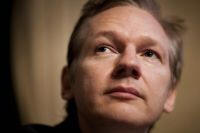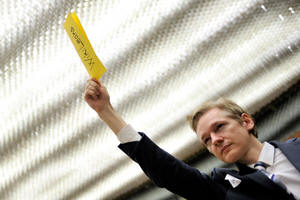![]() Nickerie.Net,
dinsdag 07 december 2010
Nickerie.Net,
dinsdag 07 december 2010
Wikileaks-oprichter Assange aangehouden in Engeland
London - Wikileaks-oprichter en -boegbeeld Julian Assange is dinsdagochtend in Engeland aangehouden door Scotland Yard. Zijn juridisch adviseur spreekt van een politieke stunt en zegt dat Assange met de politie wil praten om zijn naam te zuiveren.
 Assange wordt in
Zweden verdacht van verkrachting, aanranding en het uitoefenen van dwang. Twee
Zweedse vrouwen beschuldigen Assange daarvan. Naar aanleiding daarvan werd
Assange door Interpol gezocht. Assange heeft de beschuldigingen altijd ontkend.
Volgens zijn advocate Jennifer Robinson, wist Assange tot gisteravond nog steeds
niet tot in detail waarvoor hij gezocht werd, schrijft
The Guardian.
Assange wordt in
Zweden verdacht van verkrachting, aanranding en het uitoefenen van dwang. Twee
Zweedse vrouwen beschuldigen Assange daarvan. Naar aanleiding daarvan werd
Assange door Interpol gezocht. Assange heeft de beschuldigingen altijd ontkend.
Volgens zijn advocate Jennifer Robinson, wist Assange tot gisteravond nog steeds
niet tot in detail waarvoor hij gezocht werd, schrijft
The Guardian.
Assange is in London bij het politiebureau aangehouden, nadat hij zich vrijwillig had gemeld en maandag al had aangegeven via zijn juridisch adviseur met de politie te overleggen. Aangenomen werd dat Assange zich daarvoor in het zuidoosten van Engeland ophield. Nadat de Australiër door de politie is verhoord, zal hij voor de magistraat van de City of Westminster moeten verschijnen, die beslist of er een bevel tot uitlevering komt.
De juridisch adviseur van Assange, Mark Stephens, liet Sky News al weten dat elke poging tot uitlevering zal worden aangevochten, 'vooral omdat hij aan de Amerikanen kan worden overgeleverd'.
Update 11.50: Extra informatie over aanhouding in London met link naar The Guardian toegevoegd.
N.Net extra:
Assange was altijd onderweg
LONDEN - Australiër Julian Paul Assange (39) is hoofdredacteur en het gezicht van klokkenluiderswebsite WikiLeaks. De man die voortdurend verhuisde, lekt in die rol met regelmaat overheidsgeheimen die steevast voor ophef zorgen.
 Julian Assange
Foto: Reuters
Julian Assange
Foto: Reuters
Assange is een journalist, internetactivist en hacker die geboren werd in de stad Townsville in het noordoosten van Australië. Zijn ouders hadden een reizend theatergezelschap, wat ervoor zorgde dat hij tientallen scholen en zes universiteiten bezocht.
Uiteindelijk vestigde hij zich in Melbourne waar hij aan de slag ging als computerprogrammeur. Assange kreeg in die periode een zoon die inmiddels bij zijn ex-vriendin woont. Het stel ging uit elkaar toen Assange begin jaren negentig vervolgd werd voor zijn bezigheden als hacker.
Sinds bekend werd dat Assange betrokken was bij WikiLeaks, heeft hij geen vaste woonplek meer. Naar eigen zeggen sliep hij op vliegvelden, om te voorkomen dat Amerikaanse veiligheidsdiensten hem in handen kregen. Hij woonde onder andere in Tanzania, Kenia, IJsland en Zweden. Hij maakt daarbij onder meer gebruik van zijn netwerk onder internetactivisten.
Ook de Nederlandse internetactivist Rop Gonggrijp is een kennis van Assange. De oprichter van de internetprovider XS4ALL is nauw betrokken bij WikiLeaks. Zo hielp hij in maart 2010 mee met het publiceren van videobeelden waarop te zien is hoe een Amerikaanse Apache-helikopter in 2007 achttien Iraakse burgers doodde.
Assange denkt dat hij overal gevolgd wordt. Omdat hij vermoedt dat hij gevaar loopt door zijn werkzaamheden, verhuist hij vaak. Mediaoptredens zijn zeldzaam. Veel communicatie met de buitenwereld verloopt via de website van WikiLeaks en via Twitter. Het is bekend dat hij vaak werkt op computers die niet op het internet zijn aangesloten.
Kritiek op WikiLeaks legt Assange naast zich neer. Tegenstanders vinden dat de geheime documenten de veiligheid van landen, instanties en personen in gevaar brengen. Zo zouden volgens mensenrechtenorganisaties Afghaanse burgers die meewerken met de Amerikanen traceerbaar zijn geworden door gelekte documenten. Ook het gebruik van volledig anonieme bronnen levert Assange kritiek op.
Volgens Assange heiligt het doel echter de middelen. Hij vindt een transparante, controleerbare overheid en het naar buiten brengen van misstanden zwaarder wegen dan de nadelen. Zijn motto, zoals hij dat in het Britse weekblad The Economist verwoordde: „informatie die klopt, doet goed.”
Julian Assange’s anti-political politics
The Economist, Nov 30th 2010
ALLOW me to also respond to my colleague's post defending the latest document-dump by WikiLeaks and Julian Assange, in which he writes. Organisations such as WikiLeaks, which are philosophically opposed to state secrecy and which operate as much as is possible outside the global nation-state system, may be the best we can hope for in the way of promoting the climate of transparency and accountability necessary for authentically liberal democracy. Julian AssangeI submit that this is true only if an "authentically liberal democracy" is a post-political paradise unlike any form of communal association ever seen in human history.
 Julian
Assange
Julian
Assange
From its origins in the 17th century, liberal political theory has been motivated in part by the impulse to check the power of the state—for the sake of both individual freedom and the common good. That's what makes liberalism a theory of limited government. But from the beginning this impulse was itself limited in scope. None of the early modern liberals would have considered it either possible or desirable for the state to strive for complete transparency in matters of foreign policy and diplomacy. To do so would be to ask the state to cease abiding by the most elementary rules of human relations—including the rule so clearly explicated by my other colleague in a post far more critical of WikiLeaks:
It's part of the nature of human communication that one doesn't always say the same thing to every audience. There are perfectly good reasons why you don't always tell the same story to your boss as you do to your spouse. There are things Washington needs to tell Riyadh to explain what it's just told Jerusalem and things Washington needs to tell Jerusalem to explain what it's just told Riyadh, and these cables shouldn't be crossed. There's nothing wrong with this. It's inevitable. And it wouldn't make the world a better place if Washington were unable to say anything to Jerusalem without its being heard by Riyadh, any more than it would if you were unable to tell your spouse anything without its being heard by your boss.
The one line in this admirably lucid statement that I would revise is the one about how there is "nothing wrong" with this average-everyday form of duplicity. On the contrary, as a form of duplicity it is morally troubling. But sometimes securing the common good requires morally troubling actions. That's a basic fact of politics that some contemporary liberals and libertarians, like many anti-liberal leftists, will not abide. In their view, liberal checks on government—like oversight by our elected representatives—is insufficient. We need far more than that. We need to eliminate duplicity altogether.
That is what I take Mr Assange to be getting at in his predictably pretentious and self-righteous denunciation of the "authoritarian conspiracy" that runs the United States. As David Brooks argues today, Mr Assange could be considered an anarchist. He's out to tear down all existing liberal democratic institutions—and perhaps all political institutions of any kind—because they fall short of his preciously naïve, anti-political vision of moral purity.
American liberals and libertarians need to be very careful to distinguish their own laudable efforts to achieve greater institutional transparency from the efforts of this unelected fanatic to topple those same institutions. The former can justly be described as an "authentically liberal democratic" vision of reform. The latter is next of kin to nihilism.
(For more on the anti-political temptations of contemporary liberalism and libertarianism, I recommend the work of French author Pierre Manent. See, for example, these two books. Photo credit: AFP)
| Bron(nen) / Copyright: | |
|
Nickerie.Net / Tweaker / Telegraaf / The Economist |
07-12-2010 |
|
|
Email: info@nickerie.net
Copyright © 2010. All rights reserved.
Designed by Galactica's Graphics